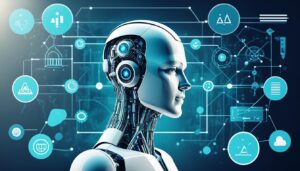
Today, knowing about AI is key as tech quickly changes. AI, or artificial intelligence, is now a big part of our world. It means machines that can think like us, used in many different ways.
There are two types of AI: Narrow and General. Narrow AI works on specific tasks like virtual assistants. These are parts of our everyday life. General AI, with the power to think like humans, is still something we hope to see in the future.
Machine Learning is a core part of AI. It lets systems get better by using data. This has changed many areas, like health and money matters.
Neural networks are inspired by our brains. They’re key in AI for recognizing images and voices. Natural Language Processing, or NLP, lets machines understand us. It helps bridge the gap between humans and technology.
As AI becomes a bigger part of life, we must think about its ethics. This includes issues like unfair algorithms and keeping data safe. The future of AI is full of possibilities, from better health tests to advanced learning tools.
Key Takeaways:
- Understanding AI is becoming increasingly important in today’s technological landscape.
- AI can be categorized into Narrow AI and General AI.
- Machine Learning is a pivotal aspect of AI, enabling systems to learn from data.
- Neural networks, inspired by the human brain, play a fundamental role in many AI applications.
- Ethical considerations related to AI, such as algorithmic bias and data privacy, are crucial to address.
Types of Artificial Intelligence and Machine Learning
In the world of Artificial Intelligence (AI), we know three main types. Each type serves specific purposes and targets certain tasks. Narrow AI, General AI, and Machine Learning are these key categories.
Narrow AI (Weak AI)
Narrow AI is built for exact tasks and shines in doing them. Voice assistants like Siri and smart driving cars use this AI. It focuses on a limited set of activities, doing them really well.
General AI (Strong AI)
General AI aims for human-like thinking in machines. It’s about creating AI that can learn and decide across many tasks. While still a goal, General AI sparks much excitement in the research world.
Machine Learning
Machine Learning lets AI improve by learning from data. It uses patterns and data to make predictions or decisions. This AI subset is crucial, especially for recognizing images or understanding speech.
Neural networks are a big part of Machine Learning. They work like our brains to spot patterns in data. These networks are key in recognizing pictures or transcribing speech.
Natural Language Processing (NLP) helps computers understand us. It’s behind chatbots and virtual assistants, making our talks with machines easier. NLP is vital for smoother communication between humans and machines.
Ethical AI development is a must. We need to keep bias low and data private. As AI grows, tackling these ethical issues is important for its future.
AI is already a big part of our daily life. It’s in voice assistants, tailored recommendations, and even cars that drive themselves. AI is changing many industries, improving how we live and work.
AI in Everyday Life
- Virtual Assistants: Siri, Alexa, Google Assistant
- Recommendation Systems: Netflix, Spotify, Amazon
- Autonomous Vehicles: Tesla, Waymo, Uber
Delving into AI requires addressing its ethical aspects. We have to work on reducing bias and protecting data. This effort ensures AI’s benefit to society.
Understanding AI and Machine Learning helps us glimpse its future. It’s the starting point for anyone eager to dive into this tech field.

The Future of AI and Practical Tips for Getting Started
The future of AI is filled with exciting chances for many areas. One key beneficiary will be healthcare diagnostics. Advanced AI algorithms can help doctors diagnose more accurately. This can lead to better treatment plans and help patients recover faster. AI can also change how students learn. It can make learning more personal and keep students more engaged.
As AI gets better, we can look forward to big discoveries. Scientists are using AI to look through lots of data. This is helping to discover new things in genomics, climate study, and making new medicines. AI can also change how we get around. It can make traveling more efficient and better for the planet.
But, with these exciting changes come important questions. We need to think about how AI affects society and ethics. It’s important to join conversations about AI’s development. This ensures AI is made and used in a fair and clear way.
Want to start with AI? Here are some tips to help you. First, learn the basics of AI and areas like machine learning. You can find online courses and tutorials for this. Don’t be afraid to try out AI tools yourself, too. Joining AI communities is a great way to learn and get support as you explore AI.
FAQ
What is artificial intelligence (AI)?
What are the types of artificial intelligence?
What is Narrow AI?
What is General AI?
What is machine learning?
What are neural networks?
What is natural language processing (NLP)?
How has AI integrated into our daily routines?
What ethical considerations are there in AI development?
What possibilities does the future of AI hold?
How can one get started with AI?
What benefits can come from embracing AI?
Source Links
- https://medium.com/@cloudix.bussnis/demystifying-artificial-intelligence-a-beginners-guide-to-understanding-ai-1e351b93d87b
- https://www.linkedin.com/pulse/demystifying-ai-laymans-guide-understanding-santhosh-sachin-mlpvc?trk=public_post_main-feed-card_feed-article-content
- https://futurumgroup.com/insights/demystifying-ai-ml-and-deep-learning/






